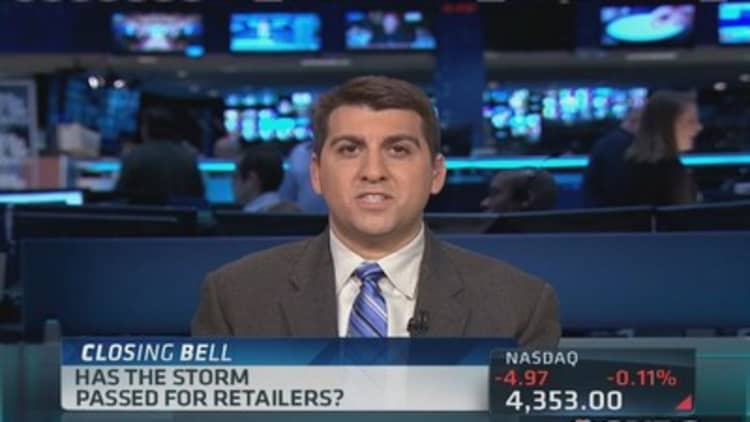"Forgive and forget"—it's a mantra that's embraced by many.
Unfortunately for Target, not as many of its shoppers are abiding by the principle as it had probably hoped.
Not only are the retailer's sales taking a hit in the aftermath of a data breach that compromised the information of as many as 110 million shoppers, fewer people are visiting the stores in the first place.
According to a new report from Kantar Retail, only 33 percent of U.S. households said they shopped at either a Target or SuperTarget in January, which was the retailer's lowest level of shopper penetration in the past three years. It's also a 22 percent decline compared with the same month in 2013, and a big dip compared to its monthly high of 53 percent of households in December 2007.
(Read more: Target CIO resigns in wake of data breach)
Although the retailer's numbers had been on a downward trend for the past seven years—which is not a surprise, given the shift toward online shopping—the big difference was seen during the holiday season, said Kantar Retail senior analyst Rachel McGuire.
That's because Target didn't register as big of a bump in shoppers as it typically does in the critical December month. The retailer's shopper penetration has historically increased between seven and 10 percentage points in December, but last year it only rose three percentage points.

"Our shopper data reflects the extent to which this issue continues to influence shopper behavior," McGuire said.
The largest shift away from the discount retailer was seen among its core demographics—those between the ages of 32 and 49 as well as lower-income shoppers, whose penetration fell by 30 percent.
The impact also took a bigger toll on Target's less-dedicated shoppers. While only 4 percent of the retailer's monthly visitors said they are less likely to shop at Target going forward, 10 percent of its overall customer base said they're less likely to shop with the retailer down the line.
(Read more: Target warns breach could hurt future profit)
For the fourth quarter, Target's domestic comparable-store sales fell 2.5 percent from the same quarter a year earlier. The results were driven by positive same-store sales ahead of the Dec. 19 news of the breach, which were followed by "meaningfully softer results" after the announcement.
The discounter doesn't break out its e-commerce sales, but in its fourth-quarter earnings call last week, Executive Vice President Kathee Tesija said its online business grew slightly more than 20 percent.
Also in its earnings report last week, CEO Gregg Steinhafel said he was "encouraged that sales trends have improved in recent weeks."
A Target spokesperson said the company did not have additional details to share outside of what was said during its earnings call.
A study by YouGov's BrandIndex, which measures daily brand perception among consumers, saw similar results as Steinhafel's observations.
Although the company's consumer perception score as of Thursday was 2.6—nine points lower than the current score for the overall discount retail sector—it's a big improvement over the low of nearly -35 it hit after the breach, on Jan. 13.
Scores range from 100 to -100 and are calculated by subtracting negative feedback from positive. A score of zero means that a company has received equal positive and negative feedback from respondents. The index interviews 4,300 people each weekday to draw its conclusions.
(Read more: This may get teens back into Abercrombie)
In either case, it appears the retailer has some work to do before restoring its consumer perception to levels seen prior to news of the breach, when it logged a score of 26—more than twice the average of the other big retail chains during the holidays.
In addition to Target, Wal-Mart also attracted fewer shoppers in January compared to the prior year, though the decrease was not nearly as steep, Kantar said. Although a number of retailers are seeing slightly smaller shopper bases, as consumers visit fewer retailers, Costco and Sam's Club saw slight upticks in shopper penetration in January, as did Amazon.
"Target is at a critical inflection point, as it strategizes how to win back the confidence of shoppers," said Kantar Retail senior analyst Amy Koo.
—By CNBC's Krystina Gustafson. Follow her on Twitter @KrystinaGustafs.
UPDATE: The text of this story was updated to provide additional information from Kantar Retail, including comparative information about traffic patterns at Target's peers.


